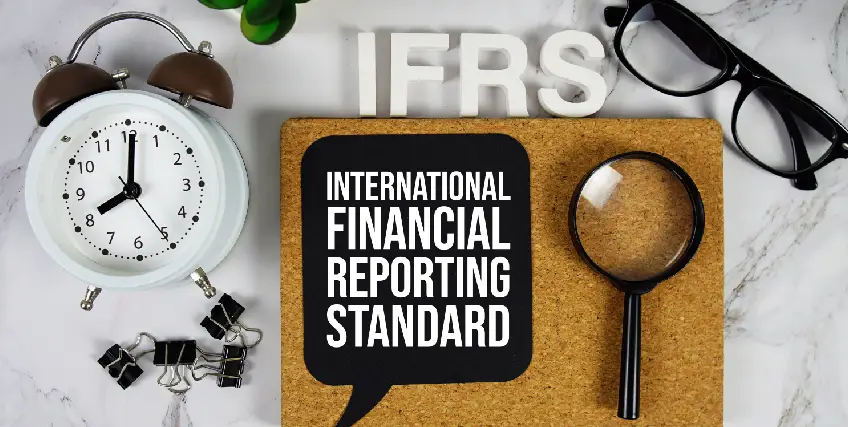Financial Reporting Standards in 2026: What’s Changing and Why It Matters
November 15, 2025 | Last Updated on: November 15, 2025

Staying updated with the financial reporting standards of 2025 is necessary. This helps maintain compliance, ensure transparency with financial disclosure, and avoid regulatory penalties. You should keep a check on constant global regulatory bodies such as SEC, IFRS, EFRAG, and FERC, and as a business owner, you should adapt to the new reporting framework to be able to meet the compliance requirements.
In case you fail on these parameters, it can take you to legal consequences, fines, and loss of investor confidence. Businesses and organizations should prepare actively for these changes as reporting has become more digitalized with XBRL automation and advanced reporting standards.
This article will help you with a detailed guide to the major updates in financial reporting standards for 2025 that are issued by the international accounting standards board and financial regulatory bodies.
Businesses will also be able to know about the actionable steps that they need to implement for the changes, leverage AI-driven solutions for financial reporting, and ensure compliance. It doesn't matter what financial position or designation you hold in the company, it is necessary for you to understand these updates for staying ahead in the year 2025.
Financial Reporting Landscape of 2025
As the global capital markets and financial markets evolve, 2025 financial reporting standards are updated to make sure that there is an advanced level of transparency, consistency, and accuracy in the corporate financial analysis. Regulatory authorities and governments are coming up with stricter compliance frameworks for aligning with international accounting policies which are principles-based, which will make it easier for auditors, stakeholders, and investors for analyzing financial statement across multiple jurisdictions. These are some essential changes toward Extensible Business Reporting Language (XBRL) compliance, and digital financial reporting.
A number of regulatory bodies are responsible for developing these financial reporting standards. The International Financial Reporting Standards Foundation established a worldwide accounting rule-based that is widely used throughout the major economies. The Financial Accounting Standards Board governs U.S. Generally Accepted Accounting Principles, which ensures standardized financial reporting within the U.S. The U.S. Securities and Exchange Commission enforced requirements for financial disclosure, which included XBRL reporting and ESG compliance for companies traded publicly.
Meanwhile, the European Financial Reporting Advisory Group will focus on developing sustainability and financial reporting standards for the companies that operate within the European Union, especially under the European Sustainability Reporting Standards. Lastly, the Federal Energy Regulatory Commission will look after the financial reporting compliance for utility and energy companies and make sure transparency in reporting within the regulated energy sector.
Understanding the role of key financial regulatory bodies is critical for businesses aiming to comply with IFRS 18, the FASB 2025 GAAP updates, evolving SEC disclosure requirements, and new ESG reporting standards. By staying informed, companies can strengthen their internal controls for financial reporting, proactively align their financial strategies, and leverage AI-driven reporting solutions. This approach enhances transparency and helps mitigate the risks associated with non-compliance.
Major updates from regulatory bodies in 2025 financial reporting standards
Since financial reporting continues to flourish, global regulatory bodies implement new financial reporting standard-setting to provide clarity with digital compliance, transparency, and comparability. These changes have a heavy impact on business across the globe, which asks them to update their financial statement, switch to automated reporting solutions, and enhance ESG disclosures. Below mentioned are some of the key updates:
International Financial Reporting Standards
The IFRS Foundation is introducing transformative updates to standardize financial reporting globally. Businesses must enhance internal controls for financial reporting to meet the new clarity and disclosure requirements.
XBRL (eXtensible Business Reporting Language) Enhancements
Expanded XBRL requirements make structured, machine-readable financial data mandatory for public companies. Enhanced tagging accuracy ensures greater investor access and regulatory transparency.
IFRS 18 – Presentation and Disclosure in Financial Statements
IFRS 18 mandates detailed breakdowns in financial statements to improve investor transparency. Companies should begin preparations in 2025 to meet the January 1, 2027, effective date.
IFRS 19 – Subsidiaries Without Public Accountability
IFRS 19 simplifies reporting for private subsidiaries, reducing disclosure burdens without compromising quality. It streamlines compliance while maintaining alignment with global IFRS standards.
2025 GAAP Financial Reporting Taxonomy
The new taxonomy demands granular revenue and expense categorization for better financial clarity. It pushes companies to disaggregate income statement data and refine financial disclosures.
Financial Accounting Standards Board – U.S. GAAP
FASB's latest updates enhance financial transparency by requiring more detailed reporting under U.S. GAAP. Improved internal controls for standard accounting reports will be critical for successful implementation.
Sustainability Reporting (ESRS – European Sustainability Reporting Standards)
Starting in 2025, the European Sustainability Reporting Standards (ESRS) will make Environmental, Social, and Governance (ESG) reporting mandatory for large companies. Under these new financial reporting standards, detailed sustainability disclosures will become an integral part of annual financial statements.
Organizations must report on their environmental impact, social policies, and governance practices with the same rigor as traditional financial data. This shift reflects the growing global emphasis on transparency and accountability. By aligning ESG reporting with financial reporting standards, companies will need to ensure consistency, reliability, and relevance in their disclosures to meet stakeholder and regulatory expectations.
Impact of 2025 financial reporting standards on business
With the introduction of new financial reporting standards in 2025, businesses should adopt the updated digital reporting mandates, compliance requirements, and ESG disclosure obligations. If any business fails to sync with these changes they will have to pay regulatory penalties, operational inefficiencies, and investor distrust.
Companies should proactively modernize their financial reporting standards, make sure there is transparency in financial disclosure, and implement automatic solutions of the compliance. This process also helps cut down on manual errors, streamline compliance with international financial regulations, and improves accuracy.
Steps to prepare for the transition to 2025 financial reporting standards
With the coming up of new financial reporting standards, which are being enforced by FASB, EFRAG, IFRS, FERC, and SEC in 2025. Businesses should take measures to make sure compliance, and align financial performance disclosures along with implementing digital reporting solutions such as XBRL automation.
By now, you must have an idea that companies that fail these parameters face regulatory penalties, misalignment of financial statements, and challenges with investor reporting.
Final thoughts
The 2025 financial reporting standards have started to transform how companies showcase, structure, and disclose financial data. The new regulations by IFRS, FASB, SEC, EFRAG, and FERC have asked businesses to adopt the ever-changing compliance requirements, maintain transparency, and embrace digital financial instruments.
Companies that fail to do so will have to pay regulatory penalties. Businesses that take a proactive approach by implementing AI-driven financial reporting solutions will help their businesses gain a competitive edge. These technologies streamline compliance, enhance data accuracy, reduce manual errors, and improve real-time decision-making capabilities.
Organizations can transform traditional reporting into a strategic function by leveraging automation, machine learning, and advanced analytics. Furthermore, early adoption of digital tools positions businesses to adapt more effectively to future regulatory updates. Staying ahead in financial reporting is no longer optional—it's essential for long-term growth, stakeholder trust, and operational resilience.
FAQs about financial reporting standards
What is the GAAP standard of financial reporting?
The foundational principles of GAAP include going concern, accrual, consistency, historical cost, materiality, and conservatism. Together, these six core standards establish a reliable accounting framework that businesses must follow—whether adherence to GAAP is voluntary or required by regulation.
What are the 5 accounting standards?
Five key accounting standards that guide financial reporting globally and regionally include Generally Accepted Accounting Principles (GAAP), IFRS accounting standards, Indian Accounting Standards (Ind AS), Accounting Standard 3 (AS 3) on cash flow statements, and Accounting Standard 26 (AS 26) on intangible assets.
What are the 17 International Financial Reporting Standards?
IFRS 17 sets out the principles for recognizing, measuring, presenting, and disclosing insurance contracts within its scope. Its primary objective is to ensure that entities provide relevant, transparent, and faithful representations of these contracts in their financial statements.
What are the 4 pillars of financial reporting?
The four fundamental pillars of financial reporting are relevance, reliability, comparability, and understandability. Effective financial reports should meet users' informational needs (relevance), be accurate and free from material error (reliability), enable performance benchmarking across periods or entities (comparability), and present information in a clear, accessible manner (understandability) to support informed decision-making.
What are the GAAP and GASB standards?
Established in 1984 and based in Norwalk, Connecticut, the Governmental Accounting Standards Board (GASB) is an independent, private-sector body that sets accounting and financial reporting standards for U.S. state and local governments that adhere to GAAP.
Frequent searches leading to this page
Related Articles
How Credit Scores Impact Startup Business Loans and What Founders Can Do About It
February 19, 2026
Term Loans are made by Itria Ventures LLC or Cross River Bank, Member FDIC. This is not a deposit product. California residents: Itria Ventures LLC is licensed by the Department of Financial Protection and Innovation. Loans are made or arranged pursuant to California Financing Law License # 60DBO-35839




